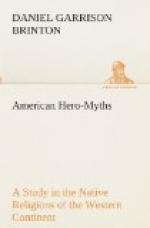[Footnote 1: “Las cosas que el Bochica les ensenaba eran buenas, siendo assi, que tenian por malo lo mismo que nosotros tenemos por tal.” Piedrahita, Historia General de las Conquistas del Nuevo Reyno de Granada, Lib. i, Cap. iii.]
The prayers addressed to these deities breathe as pure a spirit of devotion as many now heard in Christian lands. Change the names, and some of the formulas preserved by Christobal de Molina and Sahagun would not jar on the ears of a congregation in one of our own churches.
Although sanguinary rites were common, they were not usual in the worship of these highest divinities, but rather as propitiations to the demons of the darkness, or the spirits of the terrible phenomena of nature. The mild god of light did not demand them.
To appreciate the effect of all this on the mind of the race, let it be remembered that these culture-heroes were also the creators, the primal and most potent of divinities, and that usually many temples and a large corps of priests were devoted to their worship, at least in the nations of higher civilization. These votaries were engaged in keeping alive the myth, in impressing the supposed commands of the deity on the people, and in imitating him in example and precept. Thus they had formed a lofty ideal of man, and were publishing this ideal to their fellows. Certainly this could not fail of working to the good of the nation, and of elevating and purifying its moral conceptions.
That it did so we have ample evidence in the authentic accounts of the ancient society as it existed before the Europeans destroyed and corrupted it, and in the collections of laws, all distinctly stamped with the seal of religion, which have been preserved, as they were in vogue in Anahuac, Utatlan, Peru and other localities.[1] Any one who peruses these will see that the great moral principles, the radical doctrines of individual virtue, were clearly recognized and deliberately enforced as divine and civil precepts in these communities. Moreover, they were generally and cheerfully obeyed, and the people of many of these lands were industrious, peaceable, moral, and happy, far more so than they have ever been since.
[Footnote 1: The reader willing to pursue the argument further can find these collections of ancient American laws in Sahagun, Historia de Nueva Espana, for Mexico; in Geronimo Roman, Republica de las Indias Occidentales, for Utatlan and other nations; for Peru in the Relacion del Origen, Descendencia, Politica, y Gobierno de los Incas, por el licenciado Fernando de Santillan (published at Madrid. 1879); and for the Muyscas, in Piedrahita, Hist. Gen. del Nuevo Reyno de Granada, Lib. ii, cap. v.]




